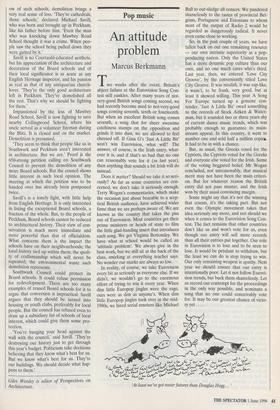Pop music
An attitude problem
Marcus Berkmann
Two weeks after the event, Britain's abject failure at the Eurovision Song Con- test still ranldes. After many years of not- very-good British songs coming second, we had recently become used to not-very-good songs coming seventh, tenth or fourteenth. But when an excellent British song comes seventh, a song that for sheer awesome catchiness stamps on the opposition and grinds it into dust, we are allowed to feel cheesed off. If Gina G's 'Just A Little Bit' won't win Eurovision, what will? The answer, of course, is the Irish entry, what- ever it is, and if that's so bad that no one can reasonably vote for it (as last year), then anything that sounds a bit Irish will do instead.
Does it matter? Should we take it so seri- ously? As far as some countries are con- cerned, we don't take it seriously enough. Terry Wogan's commentaries, which make the occasion just about bearable to a scep- tical British audience, have achieved wider fame than we are perhaps aware of. We are known as the country that takes the piss out of Eurovision. Most countries get their prime ministers or heads of state to film the little glad-handing insert that introduces each song. We get Virginia Bottomley. We have what at school would be called an 'attitude problem'. We always give in the best work, but we still sit at the back of the class, smirking at everything teacher says. No wonder our marks are always so low.
In reality, of course, we take Eurovision every bit as seriously as everyone else. If we didn't, we wouldn't go to the enormous effort of trying to win it every year. When dim little Europop jingles were the rage, ours were as dim as anyone's. When dim little Europop jingles took over in the mid- 1980s, we hired serial emoters like Michael Ball to out-sludge all corners. We pandered shamelessly to the tastes of provincial Bel- gians, Portuguese and Estonians to whom most of the output of Radio 2 would be regarded as dangerously radical. It never even came close to working.
So, in the past couple of years, we have fallen back on our one remaining resource — our own intrinsic superiority as a pop- producing nation. Only the United States has a more dynamic pop culture than our own, and no one much cares who's third. Last year, then, we entered 'Love City Groove', by the conveniently titled Love City Groove. It was modish, it was rap-like, it wasn't, to be frank, very good, but at least it showed willing. This year A Song For Europe turned up a genuine con- tender. 'Just A Little Bit' owed something to the records of Stock Aitken & Water- man, but it sounded two or three years shy of current dance music trends, which was probably enough to guarantee its main- stream appeal. In this country, it went to number one and sold half a million copief. It had to be in with a chance.
But, as usual, the Greeks voted for the Cypriots, the Cypriots voted for the Greeks and everyone else voted for the Irish. Some of the voting beggared belief. Mr Wogan concluded, not unreasonably, that musical merit may not have been the main criteri- on. But for whatever reason the British entry did not pass muster, and the Irish won by their usual convincing margin.
Some might say that it's not the winning that counts, it's the taking part. But not even the Olympic movement takes that idea seriously any more, and nor should we when it comes to the Eurovision Song Con- test. The fact remains that other countries don't like us and won't vote for us, even though our entry will sell more records than all their entries put together. Our role in Eurovision is to lose and to be seen to lose. It would be petulant to withdraw, but the least we can do is stop trying to win. Our only remaining weapon is apathy. Next year we should ensure that our entry is intentionally poor. Let it not follow Eurovi- sion trends, but buck them shamelessly. Let us record our contempt for the proceedings in the only way possible, and nominate a song that no one could conceivably vote for. It may be our greatest chance of victo- ry yet ... .
'At least we've got rosier futures than Douglas Hogg... '


























































 Previous page
Previous page